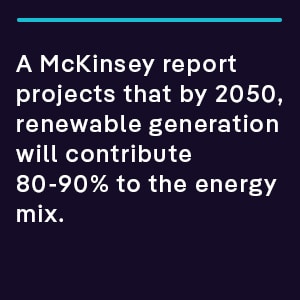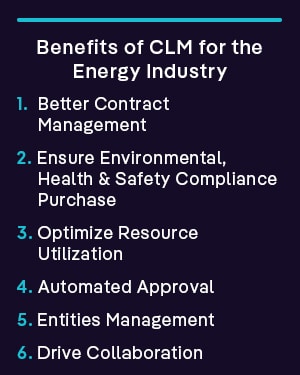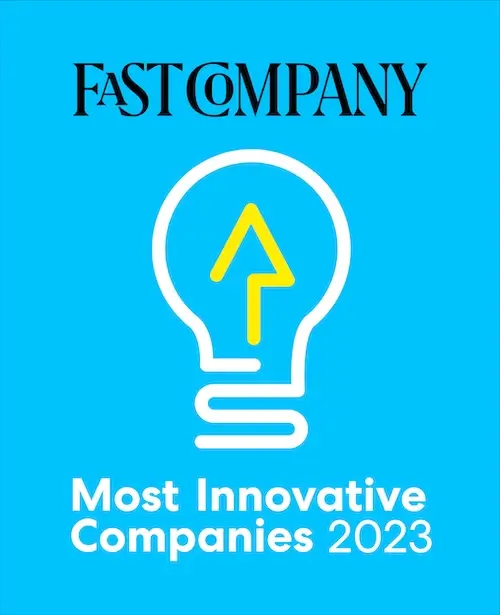Energy industry projects are large in scale, carry significant risks, and are highly regulated. For these reasons, the contracts that govern these projects and related partnerships are often complex, detailed, and written to endure ongoing regulatory audits and legal scrutiny.
Petroleum-related energy projects require costly, complex equipment to find new oil deposits and send the yield downstream through the supply chain through the combined efforts of many service providers. Electric, water, and gas utilities have vast grid and pipeline infrastructures that require many suppliers, service providers and government entities with specialized services to build, secure, oversee, and monitor them. Energy prices fluctuate greatly based on the rise and fall of supply and demand, making forecasting challenging.
What is CLM for the Energy Industry?
Contract Lifecycle Management (CLM) for the energy and utilities industry is the meticulous management of legal agreements between multiple entities from initiation through award, compliance, and renewal. Implementing a CLM platform can significantly improve cost efficiency and effectiveness.
The long-term relationships between organizations that extract, collect, generate, and distribute energy foster trust and respect between parties as they share successes and failures. Yet they still require sophisticated contracts and expertly engineered dynamic workflows. Energy companies often have contract repositories with tens of thousands of agreements. Keeping track of expiry dates, obligations, milestones, and other details beyond the abilities of highly efficient contract management teams to keep track of.
Why CLM Should Be a Priority for the Energy Industry
With the fast pace of change in the utilities, renewable and non-renewable energy sectors, successful companies need to automate, streamline, and get better insights into key contract-related business processes:
Better Contract Management
Standardized contracts, automated workflows, and digital approvals mitigate delays and friction between contract parties and their legal teams. In-house attorneys and paralegals don’t want to process bottlenecks or subject their organization to unnecessary risk and liability. Here are aspects of CLM which produce ideal outcomes when managed effectively on a next-generation platform.
1. Contract Authoring
The complexity of energy sector agreements and regulatory scrutiny over records management practices in the industry make automated contract authoring, assembly, and review a tremendous asset and competitive advantage. Self-service contracts provide legal teams with peace of mind that contract language is audit-ready and management approved beforehand.
2. Regulatory Compliance
Energy sector contracts may be subject to laws in multiple jurisdictions and regulatory environments. This makes training a virtual contract assistant to identify issues like language which could compromise environmental, health or safety standards and policies. A sound CLM system will have a library of compliant clauses and be flexible enough to change with evolving regulations.
3. Performance Monitoring
Ensuring all parties meet their contract obligations is essential for any business. Yet, a missed milestone or deliverable in the energy industry can have costly and dangerous consequences. Historical and predictive performance analytics powered by machine learning can identify contract performance issues as they happen. Or, when properly configured for alerts, milestones or renewals are missed before delivery.
4. Risk Management
Price elasticity, political instability, and accident risk combine to make it crucial for parties to build provisions and contingencies which align with their risk tolerance. Clauses related to legal matters like liability, force majeure, and price adjustments are vital to energy businesses.
5. Contract Renewal and Termination
Energy contracts often last many years. However, ensuring obligations are met along the way and until termination is vital. Suppliers and service providers must ensure renewal terms are fair and predictable while leaving room for negotiation to account for changing market conditions.
6. Vendor and Partner Management
As stated earlier, energy companies often work with a broad spectrum of partners, contractors, and vendors 
Renewable energy sources like solar, wind, hydro, and biofuels are on the rise. A McKinsey report projects that by 2050, renewable generation will contribute 80-90% to the energy mix. Yet fossil fuels are the leading energy source for now, with many vendor and partner relationships along the upstream and downstream legs of the supply chain. Having visibility to contracts that bind and govern these relationships is crucial.
Ensure Environmental, Health & Safety Compliance
In environments like oil rigs, oil sands, power substations, and water distribution plants, accidents can have dangerous and long-lasting consequences for employees, the public, and the natural environment.
Ensuring vendors and service providers have safeguards to protect your assets and your communities is critical. As is ensuring your business and the vendors, you deal with document contingency plans, insurance coverage, and remediation measures that are in place. It is essential for regulators, investors, and other stakeholders to see controls in place to minimize the impact and injury involved should an incident occur.
Optimize Resource Utilization
Contract-related analytics engines can help contract administrators and other business users by automating contract reviews to identify key information and reducing contract cycle time by streamlining contracting processes. Businesses can improve regulatory compliance by identifying gaps or inconsistencies in contracts and enhancing supplier management by tracking supplier performance and identifying areas for improvement.
Professional service firms in the energy consulting or installation space can find insights in their contract data related to the utilization rates and demand for subject matter experts and engineers with different skill sets. It can also identify the equipment and materials required for upcoming projects to ensure they don’t delay important initiatives.
Automated Approval
Automating approvals streamlines the contract approval process and reduces delays by eliminating bottlenecks in legal departments and at executive levels. Enabling contract administrators to have more autonomy over lower-value purchases, sales, payment terms other matters. With automated contract approval within defined dollar values or risk parameters, contracts can be reviewed and approved quickly and efficiently, freeing up executives to focus on priority activities. Increased adoption of digital signatures and business process automation makes automated approvals easy and audit-worthy as long as the parameters and process are well documented.
Automating approval workflows is especially beneficial for large energy companies and utility companies that manage significant amounts of operational contracts and need to execute them rapidly. Additionally, automated contract approval can help ensure that agreements are consistent and compliant with relevant regulations and standards, reducing the risk of legal or financial penalties. Self-service contract approval helps energy firms and utilities to reduce operational and financial risks and ultimately better serve their customers.
Entities Management
Attracting, qualifying, and monitoring supplier relationships can be challenging without an advanced CLM platform and within the regulatory confines of the energy sector. Creating, reviewing, and managing requests for proposals, supplier onboarding, and monitoring vendor obligations demands constant oversight. Utilities and other energy companies also need to ensure they are meeting their own obligations.
As energy companies grow and contract with more supply-side and sell-side partners, these due dates, deliverables, and milestones are next to impossible to keep on top of without a powerful CLM platform.
Drive Collaboration
Internal and external communications before, during, and after contract negotiations need to be secure and efficient. Enabling business users from all contracting parties to work within familiar document applications like Microsoft Office and Google Workspace can make contract creation easy. It also facilitates editing and contract negotiation activities like redactions, redlining, and version control.
Although many businesses are welcoming employees back to their offices, energy executives can’t always meet their suppliers and other partners in person. Real-time online collaboration within a secure, virtual “negotiation room” can streamline a lot of passing contract documents back and forth via email.
The ContractPodAi CLM Solution
ContractPodAi offers contract lifecycle management solutions that meet energy industry regulatory compliance requirements and empower contract professionals to work smarter, not harder. Self-service authoring, automated review, and online collaboration enable utilities to work more productively with its suppliers, customers, partners, and other stakeholders.
For more information about CLM and in-house legal solutions for the energy and utilities industry sectors, visit our solution page.
Read More








